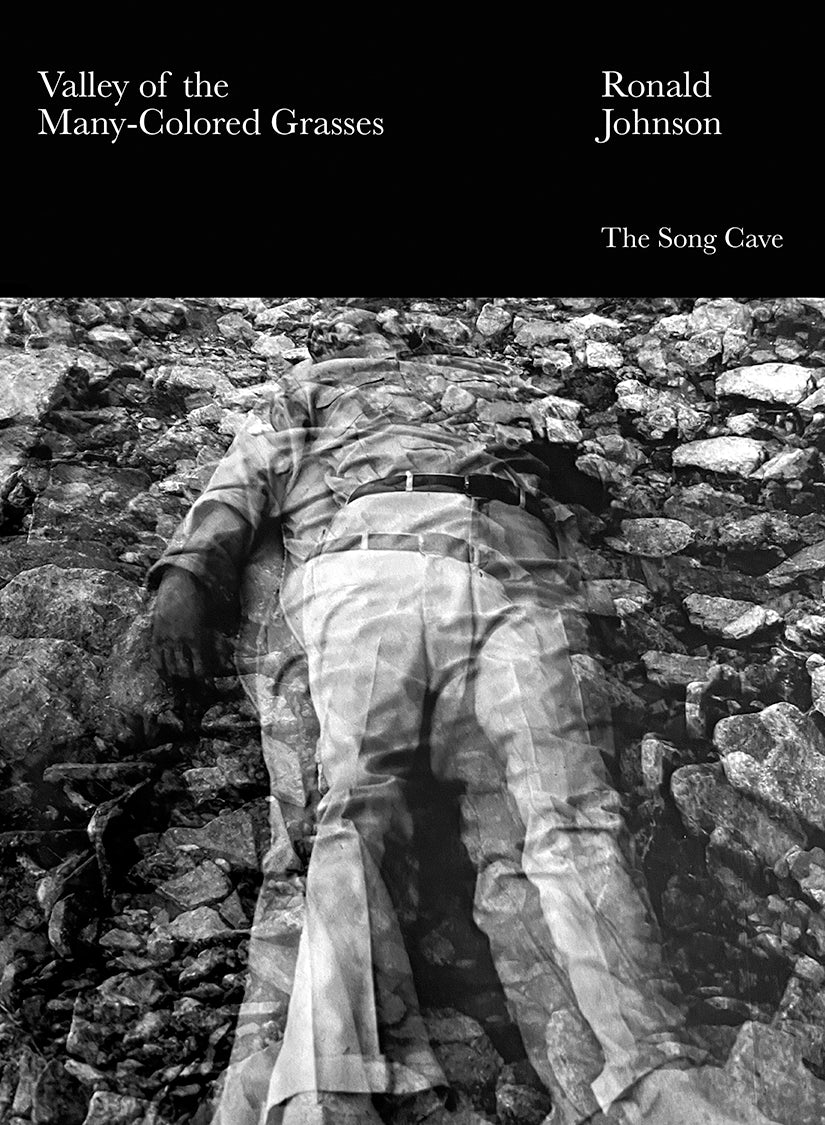Valley of the Many-Colored Grasses by Ronald Johnson
Valley of the Many-Colored Grasses by Ronald Johnson
Couldn't load pickup availability
For international orders, please visit our distributor, here.
"I count Ronald Johnson as one of the defining peers of my own imagined company of poets." —Robert Creeley
Ronald Johnson's underground classic of visionary and queer poetics, Valley of the Many-Colored Grasses, has been legendarily hard to find for over 50 years.
In this book of poems, Johnson creates a specifically North American vision that references everything from ancient Native American myths to Johnny Appleseed, from Charles Darwin to the Wizard of Oz, microcosmically transforming the vast open expanse of the plains into delicate flower petals. These are poems of observation, transformation, and a uniquely subtle sensibility harmonically tuned to the stars. Masterfully crafted examples of poetic music and textures, Johnson weaves together texts to show the world from multiple angles of vision, not only his own, to explore what others have seen and experienced of the world. One of the most unheralded poets in literature, Ronald Johnson needs to be securely placed in history with the likes of his fellow dreamers: Stan Brakhage, Marguerite Young, Charles Ives, Marsden Hartley, and the Transcendentalists.
In Valley of the Many-Colored Grasses, the American eye becomes a wholly new and newly transcendent pastoral Witness. It beholds, through these poems, cultivation as vision, and the garden world as an extension of vision into a substantial eternity. The book is a flowering fugue. And thus it is that the whole motion of the book is towards precisely those “different musics” in which Johnson discerns prismatic truth, “fugue, & petal,” flowering into fact. Valley of the Many-Colored Grasses joins Thoreau's Walden and Charles Ives's Essays Before a Sonata as a foundational document of an America yet to be made. —Donald Revell
Ronald Johnson tells us: “I am of a field sown / to corn, am neither stalk, tassel or seed, but I come of its ripening wind.” Sitting here engrossed amidst “a galaxy of gnats,” a Shaker Psyche from whose lapful of seeds he sifts “the attempt, always, at classification.” If we could lift the poet’s late, magisterial book Ark and look through it backwards as though it were a spy glass, we’d be peering into this Valley of the Many-Colored Grasses with its matter-of-fact vocabulary, lithe citation, and referential elision. We’d find ourselves in the esteemed company of Arthur Dove, Albert Pinkham Ryder, Harry Partch, L. Frank Baum, Carl Ruggles, Antonie van Leeuwenhoek, and Leoš Janáček, among others. —Thomas Meyer
Poems “sudden, & peculiar as mushrooms”; poems that “hold meaning / as a nest that holds speckled bird’s eggs”; poems that ask what anything is “but the power to tell / the truth of it?” Valley of the Many-Colored Grasses is an exquisitely moving consideration. Consideration, as Johnson knows and teaches, is a beautiful word that describes a gathering together of stars, as happens when you lie on the grass and look at the sky. Hamlet says the end of playing, by which he means the purpose of art, is to “hold the mirror up to nature.” Whatever the purpose of art, let it be one as gentle and discovering as Johnson’s. —Jane Gregory
A Kansas native, Ronald Johnson (1935-1998) was drafted into the U.S. Army in 1954, and attended Columbia University through the G.I. Bill. Romantically involved with the poet and publisher Jonathan Williams throughout the 1960s, the two walked the Appalachian trail and wandered throughout England before Johnson set off alone to find his own version of Oz in San Francisco. There, Johnson managed a famous gay leather bar, wrote a number of cookbooks, and became a founder of the Rainbow Motorcycle Club, a gay social club described by Johnson as a "band of lusty roistering men, often partying till dawn." His other books of poems include A Line of Poetry, A Row of Trees (1964), The Book of the Green Man (1967), Songs of the Earth (1970), Eyes & Objects (1976), Radi os (1977), The Shrubberies (2001), and ARK (1996, 2013).

